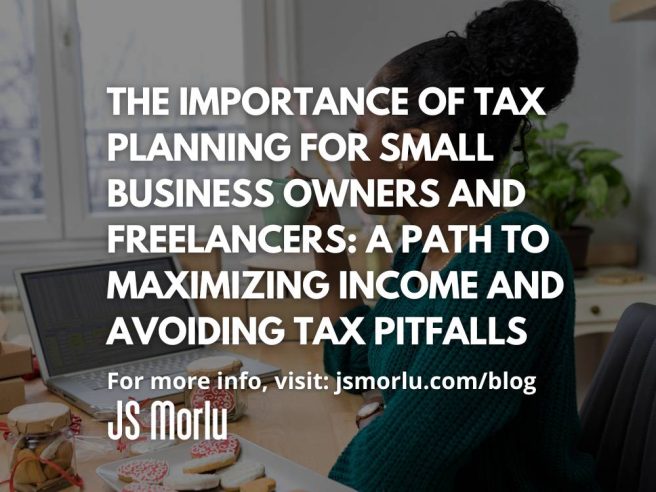By: John S. Morlu II, CPA
Albert Einstein’s famous remark, “The hardest thing in the world to understand is income tax,” continues to strike a chord with small business owners and freelancers alike. Whether you’re a sole proprietor managing every aspect of your business or a 1099 consultant juggling multiple clients, the sheer complexity of tax laws can feel like a constant source of frustration. It’s easy to make mistakes, overlook deductions, or misunderstand key requirements, and those missteps could lead to paying more taxes than you need to—or, worse, facing penalties that could put your business at risk. The good news? There’s a way out of this confusion: tax planning.
By proactively managing your finances and understanding how the tax system works, tax planning allows you to keep more of your hard-earned income. It’s not just about filing your return once a year; it’s an ongoing strategy that empowers you to minimize your tax liability, take advantage of every deduction and credit, and avoid costly surprises come tax season. Whether you’re just starting out or looking to fine-tune your approach, this article will explain why tax planning is crucial to the success of your business, highlight the tangible benefits, and offer practical steps to help you get started. Read on to discover how tax planning can transform your financial outlook and set your business up for long-term success.
Understanding the Basics of Tax Planning
Tax planning is a strategy that allows individuals and businesses to minimize their tax liability by managing their finances in a way that takes full advantage of tax breaks and deductions. While many view tax filing as an annual obligation, tax planning should be a year-round endeavor. For freelancers and small business owners, tax planning can involve decisions around how to structure your business, track expenses, and save for retirement, all while reducing your taxable income.
There are two main tax systems in the United States: one for W-2 employees and one for independent contractors (such as 1099 consultants). As a freelancer or small business owner, you fall under the second category, which offers different tax treatment and opportunities for deductions. However, it also comes with a greater responsibility for managing your finances, including the requirement to file quarterly estimated tax payments.
Why Small Business Owners and Freelancers Need Tax Planning
The benefits of tax planning go beyond just reducing your taxes. Here’s how tax planning can transform your business:
1. Maximizing Deductions
As a small business owner or freelancer, the IRS allows you to deduct legitimate business expenses that are both ordinary and necessary for your trade or business. This includes a wide range of costs such as home office expenses, travel, supplies, and even professional services. Proper tax planning helps ensure that you are capturing all of these deductions, thus reducing your taxable income. For example, if you use part of your home exclusively for business, you can claim a home office deduction. If you plan ahead and keep meticulous records, these deductions can add up to substantial tax savings.
2. Managing Cash Flow
Effective tax planning helps you manage your cash flow by avoiding unexpected tax bills. For freelancers, cash flow management is particularly important because your income is not as predictable as a salaried employee’s. By planning for taxes throughout the year—making quarterly estimated payments, setting aside funds for tax season, and staying on top of deductible expenses—you avoid a situation where you’re caught off-guard by a large tax bill come April.
3. Minimizing Tax Penalties
Freelancers and small business owners are required to file quarterly estimated tax payments to avoid penalties for underpayment. Failing to pay estimated taxes or not paying enough can result in penalties and interest charges. A tax plan ensures that you make accurate and timely payments, reducing the risk of penalties and keeping more of your hard-earned income.
4. Saving for Retirement
As a self-employed individual, you have access to retirement savings plans that offer significant tax advantages, such as SEP IRAs, Solo 401(k)s, and SIMPLE IRAs. Contributions to these accounts can reduce your taxable income now while helping you save for the future. Without tax planning, you may overlook these opportunities, missing out on tax-deferred growth for your retirement funds.
5. Choosing the Right Business Structure
Another important aspect of tax planning is choosing the right business structure for your needs. Depending on your situation, operating as a sole proprietor may not be the most tax-efficient choice. You may benefit from setting up an LLC or an S-corporation, which can provide liability protection and potential tax savings. For example, an S-corp allows business owners to pay themselves a reasonable salary and take the rest of the profits as a distribution, which may be taxed at a lower rate than self-employment income. Consulting with a tax advisor can help you determine which structure best fits your business.
6. Taking Advantage of Tax Credits
Tax credits are even more valuable than deductions because they directly reduce your tax liability, dollar for dollar. Small business owners and freelancers may be eligible for a range of tax credits, including the Earned Income Tax Credit (EITC), health insurance premium tax credits, and credits for hiring employees from targeted groups. Tax planning ensures you are aware of these credits and are taking full advantage of them.
The Dangers of Ignoring Tax Planning
Failing to engage in tax planning can have serious consequences. You may end up paying more than your fair share of taxes or, worse, face penalties for non-compliance. The complexities of the tax code mean that it’s easy to overlook deductions, misclassify expenses, or make errors in quarterly payments. Here are some common mistakes freelancers and small business owners make when they neglect tax planning:
- Missed Deductions: Without proper planning, it’s easy to miss out on deductions like the home office deduction, business travel expenses, or depreciation on business assets. These oversights can cost you thousands of dollars over time.
- Improper Recordkeeping: Many freelancers fail to keep detailed records of their income and expenses. This not only makes tax filing more difficult but also opens the door for an IRS audit.
- Late or Incorrect Estimated Payments: As a 1099 contractor, you’re responsible for paying your own taxes throughout the year. Failing to make these payments on time, or underestimating how much you owe, can result in costly penalties and interest.
How to Get Started with Tax Planning
The good news is that it’s never too late to start tax planning. Here are some steps to get you on the right track:
1. Consult a Tax Professional
While there are many resources available for learning about tax planning, nothing replaces the value of working with a tax professional. A CPA or tax advisor who specializes in small businesses and freelancers can help you identify opportunities for savings, avoid pitfalls, and ensure that your tax plan is tailored to your specific needs.
2. Track Your Income and Expenses
Keeping detailed records is essential for tax planning. Use accounting software or hire a bookkeeper to track your income and business expenses throughout the year. This will make it easier to identify deductions and prepare for tax season.
3. Set Up a Retirement Account
Take advantage of the tax benefits associated with retirement savings by setting up a SEP IRA, Solo 401(k), or SIMPLE IRA. These accounts allow you to reduce your taxable income while building a nest egg for the future.
4. Review Your Business Structure
If you’re currently operating as a sole proprietor, consider whether changing your business structure could provide tax benefits. Forming an LLC or S-corp might help you save on self-employment taxes and provide other financial advantages.
5. Plan for Estimated Taxes
Don’t wait until the end of the year to think about taxes. Make quarterly estimated tax payments based on your income and expenses, and adjust as needed to avoid underpayment penalties.
Conclusion: Take Control of Your Taxes Now
For small business owners and freelancers, tax planning is not just about filing your taxes once a year—it’s the key to unlocking significant savings, ensuring financial security, and positioning your business for long-term success. Every day that goes by without a solid tax strategy is an opportunity missed. Without proactive planning, you risk paying more than you need to, missing out on valuable deductions, or worse—facing penalties that could easily have been avoided.
The good news is that with the right approach, you can take full control of your financial future. By investing time in tax planning, you can minimize your tax liability, maximize deductions, and make smart financial decisions that propel your business forward. Don’t leave your hard-earned money on the table or wait until tax season to scramble—start planning now to avoid costly mistakes and prepare for sustained success.
With the guidance of a tax professional, you can develop a personalized strategy that aligns with your business goals and keeps you compliant with evolving tax laws. The sooner you act, the sooner you’ll start seeing the benefits. Don’t let the complexity of the tax code hold you back—take charge today!
Consider signing up for a tax planning consultation today. You’ll not only gain peace of mind but also uncover the potential for significant tax savings and business growth. Make the smart move now, and watch your financial confidence soar.
Author: John S. Morlu II, CPA is the CEO and Chief Strategist of JS Morlu, leads a globally recognized public accounting and management consultancy firm. Under his visionary leadership, JS Morlu has become a pioneer in developing cutting-edge technologies across B2B, B2C, P2P, and B2G verticals. The firm’s groundbreaking innovations include AI-powered reconciliation software (ReckSoft.com) and advanced cloud accounting solutions (FinovatePro.com), setting new industry standards for efficiency, accuracy, and technological excellence.
JS Morlu LLC is a top-tier accounting firm based in Woodbridge, Virginia, with a team of highly experienced and qualified CPAs and business advisors. We are dedicated to providing comprehensive accounting, tax, and business advisory services to clients throughout the Washington, D.C. Metro Area and the surrounding regions. With over a decade of experience, we have cultivated a deep understanding of our clients’ needs and aspirations. We recognize that our clients seek more than just value-added accounting services; they seek a trusted partner who can guide them towards achieving their business goals and personal financial well-being.
Talk to us || What our clients says about us






